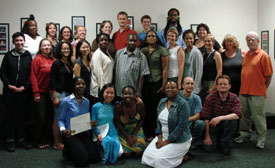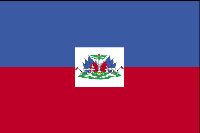Haitian Creole Language and Culture Summer Institute
The Haitian Creole Language and Culture Summer Institute has been offered in Massachusetts for over two decades. Since the summer of 1995, the Institute has been conducted at the Harbor Campus of UMass Boston under the joint collaboration of the Africana Studies Department, the Haitian Studies Program, and the Division of Corporate, Continuing and Distance Education. This year the Institute will have two components. There will be a three-week intensive program in different levels, geared toward the acquisition and practice of Haitian Creole. Also offered are two courses; one in techniques of translation for advanced students, and the other on Haitian Creole Studies.
This year the Institute will have two components. There will be a three-week intensive program in different levels, geared toward the acquisition and practice of Haitian Creole. Also offered are two courses; one in techniques of translation for advanced students, and the other on Haitian Creole Studies.
In addition to class work, all courses make use of cultural activities to enhance the study of the language. Evaluation of student achievement and proficiency for placement and progress will be conducted both informally and formally during and at the conclusion of the course.
To give participants an additional immersion in the Haitian-speaking environment they will have an opportunity to participate, on a voluntary basis, in field work activities in different Haitian community-based organizations and agencies outside the classroom time.
 Participants for the Institute come from a variety of settings across the United States looking to develop or improve their language skills. The program is designed to meet the needs of those who plan to conduct research in Haiti or in the Haitian diaspora, or who work in a volunteer or professional capacity either in Haiti during the reconstruction efforts, or with Haitians abroad.
Participants for the Institute come from a variety of settings across the United States looking to develop or improve their language skills. The program is designed to meet the needs of those who plan to conduct research in Haiti or in the Haitian diaspora, or who work in a volunteer or professional capacity either in Haiti during the reconstruction efforts, or with Haitians abroad.
Although many Institute participants come from the Boston area, the Institute staff will assist out-of-town participants to find accommodations with Haitian families, where participants are immersed in a language and culture-oriented environment.
Credit
Optional credit for all the courses is available from the Africana Studies Department. By special permission, students may receive 3 credits for independent study from the Africana Studies Department. Students taking courses for credit pay standard summer per-credit course fees (to be announced soon).Courses
- Haitian Creole I - Beginner (LANGINST 002)
- This intensive beginning-level course is intended for students with no knowledge of Haitian Creole. In small-group teaching sessions, students will be prepared for conversational fluency with basic reading and writing skills, emphasizing communicative competence as well as grammatical and phonetic techniques.
- Haitian Creole II - Intermediate (LANGINST 003)
- Skills acquired in this intermediate level course will enable students to participate actively in most social and cultural conversations. Sufficient writing and reading comprehension skills will be practiced and studied with the use of intermediate vocabulary and grammatical forms.
- Haitian Creole III - Advanced (LANGINST 004)
- At the advanced level, students will achieve a high degree of fluency and precision of vocabulary, enabling them to perform sophisticated activities. Students will be able to speak, read, and write as well as use colloquialisms, proverbs, riddles, and "contes" (jokes).
- Techniques of Haitian Creole Translation (LANGINST 005)
- This course is geared towards the native or advanced Creole language speaker who wishes to be certified as a translator or as a court interpreter. It provides participants with ample opportunities to apply techniques and skills through a series of translation assignments which form the basis for class discussion. Participants will have intensive practice in translating a variety of genres and styles both literary and non-literary. They will also be trained in techniques of consecutive and simultaneous interpretation and sight translation. Emphasis is given to accuracy, speed, delivery, command of professional lexicon, and awareness of the relationship between language and culture.
- Introduction to Haitian Studies (AFRSTY480)
- This course provides participants broad foundations of spoken and written Kreyòl, contextualized within a survey of Haitian culture. The language component of the course will be taught in a Kreyòl immersion format. Lectures and discussions on Haitian cultural and social history will be in a bilingual format (English and Kreyòl), and will focus on topics such as Haitian imaginative representations of the fall of Taino Indian culture in post-Columbian era in Hispaniola, the linguistic materialization of pidgins and Creole languages in the Atlantic slave trade, the Middle Passage in Haitian belief system (vodou) and arts, libertine mores in colonial Saint-Domingue and in 20th century tourism, the Haitian Revolution, the 1915-1934 U.S. occupation of Haiti, the 1937 "Parsley Massacre" ("El Corte") of Haitians in the Dominican Republic, the rise and fall of papa Doc/baby Doc, and the post-Duvalier democratic experience until the present. The course will provide linguistic and cultural background with a particular view to preparing undergraduate and graduate students for service, educational, or research travel in Haiti. Different intellectual aspects are explored as a vehicle to increase language competence.
